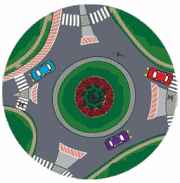This Canadian story claims that computerised tests are unfair to older drivers. In many ways, it echoes the mantra certain ADIs in this country like to chant ad nauseam.
It seems that Canada also has a permanent war on the go with the politically correct crowd:
The government needs to do a better job of explaining a computerized driving test for seniors suspected of cognitive impairment, Solicitor-General Shirley Bond said in an open letter Tuesday.
Am I the only one for whom the question “if they’ve got cognitive impairment, why the bloody hell are they on the roads in control of a 1 tonne+ killing machine” occurs?
 The Canadian exam is simply a touch-screen affair – as far as I can tell, a lot of questions and hazard scenarios are thrown up (if someone from Canada can clarify that it’d be useful), and the candidate simply touches a “button” on the screen. It isn’t a million miles away from the UK Theory Test. But – just like the UK – there are “activists”, ready to oppose anything.
The Canadian exam is simply a touch-screen affair – as far as I can tell, a lot of questions and hazard scenarios are thrown up (if someone from Canada can clarify that it’d be useful), and the candidate simply touches a “button” on the screen. It isn’t a million miles away from the UK Theory Test. But – just like the UK – there are “activists”, ready to oppose anything.
It seems that there was a recent protest by people who reckon that it is an unfair way to “assess a generation less familiar with technology”.
I’m sick of this childish argument. If some new technology comes along right now, and I’m not familiar with it, then I go out and make myself familiar. I don’t start a protest group or front a Mickey Mouse organisation to oppose the technology.
It reminds me of something from years ago, and which I have mentioned before. I’ve always been “into” technology, and had a home computer – long before PCs – in the late 70s/early 80s. At that time, you saved and loaded programs and data from a cassette tape drive, and many magazines included a free cassette of stuff on the front cover. When disk drives started to become popular – and you can imagine the clumsiness of cassettes compared to floppy disks – magazines started to change over. There was uproar from the Luddites who wanted to remain with cassettes.
All you have to do is look at what we take for granted now, and what those idiots were campaigning for, to see how totally wrong they were. The same applies to this case of using technology to replace pen and paper or other non-technology based methods of communication.
Reading the article in The Vancouver Sun suggests a very similar undercurrent, as the government is looking at “an outreach plan” to explain why you need to be medically fit to drive AND how to use the computerised system. There’s obviously more to it than just not being able to use a computer.
One 86-year old (who is “competent with computers”) says he was “completely frazzled” when he took the test. Look, I’m sorry, but if he was competent with computers, the only reasons for being frazzled were due a) to taking a test that he desperately wanted NOT to fail, and/or b) being 86 years old! Nothing short of an automatic drivers’ licence would have prevented him from being frazzled. He even reveals his desperation not to lose his independence, in a country where you have to be medically assessed fit to continue to drive beyond age 80. You can see that a whole raft of issues are being condensed down, and blamed on the computer-based test.
A local driving instructor adds fuel to the flames when he says he has received “numerous complaints from seniors”. What on earth does that prove? Nothing.
However, he does say that he thinks the concerns can be resolved. I think that’s being a little naÏve, when it is the loss of independence and being tested at 80 which is the real issue.
 This Daily Mail story could have been a whole lot funnier – but it’s still amusing in its own way.
This Daily Mail story could have been a whole lot funnier – but it’s still amusing in its own way. I love
I love  The Canadian exam is simply a touch-screen affair – as far as I can tell, a lot of questions and hazard scenarios are thrown up (if someone from Canada can clarify that it’d be useful), and the candidate simply touches a “button” on the screen. It isn’t a million miles away from the UK Theory Test. But – just like the UK – there are “activists”, ready to oppose anything.
The Canadian exam is simply a touch-screen affair – as far as I can tell, a lot of questions and hazard scenarios are thrown up (if someone from Canada can clarify that it’d be useful), and the candidate simply touches a “button” on the screen. It isn’t a million miles away from the UK Theory Test. But – just like the UK – there are “activists”, ready to oppose anything.